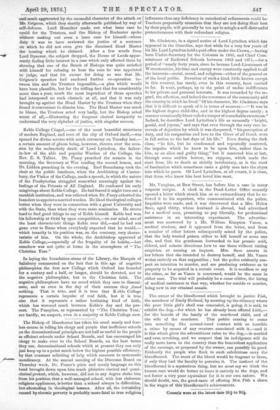Mr. Gladstone, in a signed notice of Lord Lyttelton which
has appeared in the Guardian, says that while for a very few years of his life Lord Lyttelton held a paid office under the Crown,—having been Under-Secretary for the Colonies in 1845, and Chief Com- missioner of Endowed Schools between 1869 and 1874,—for a period of "nearly forty years, since he became Lord-Lieutenant of Worcestershire, his time and energy were constantly applied to all the interests—social, moral, and religious—either of the general or of the local public. Devotion of such a kind, little known except in this country, has rarely, even in this country, been carried so far. It went, perhaps, up to the point of undue indifference to his private and personal interests. It was rewarded by the re- gard, the affection, and indeed the reverence of the community aid the country in which he lived." Of his character, Mr. Gladstone says that it is difficult to speak of it in terms of measure :—" It was in the highest degree child-like, and in the highest degree manly ; a manner oecasionally blunt veiled a temper of remarkable sweetness." Indeed, he describes Lord Lyttelton's life as unusually "bright, genial, and joyous," and says that even through the very rare in- tervals of dejection by which it was chequered, "his perception of duty, and his resignation and love to the Giver of all Good, were in full action to the last days of his life." Even during the dark close, "he felt, but he condemned and repeatedly mastered, the impulse which he knew to be upon him, rather than in him, as an alien and guilty thing;" but it mastered him at last, through some sudden horror, we suppose, which made the start from life to death as strictly involuntary, as is the start of fascination which sometimes casts a giddy man into the abyss into which he peers. Of Lord Lyttelton, at all events, it is clear, that those who knew him best loved him most.


































 Previous page
Previous page